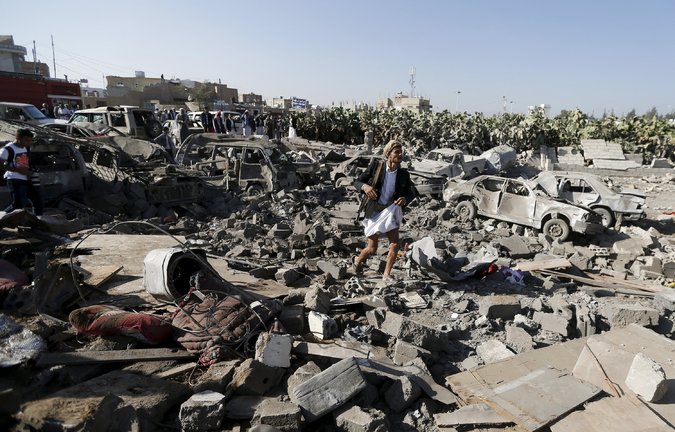Alwaght- Yemen entered the sixth day of the Saudi aggression against Yemeni people near the capital Sanaa and elsewhere in the country, and so far the coalition’s aircraft did not succeed in achieving any “military achievement” else than killing unarmed civilians. At the same time, Ansarullah Movement confirms that their rocket systems were not affected and they just have lost some ammunition stores. This was happening conjunction with the Arab League “legitimizing” the aggression on Yemen, during their last summit held in Sharm Al-Sheikh. The «Decisive Storm» assault continues in the fifth consecutive day, with intense air operations in light of assurances by Yemenis that the assault so far did not achieve any of its announced strategic goals.
On the fifth day of the Saudi assault on Yemen, airstrikes targeted al-Mozraq camp, killing and injuring of civilians. Moreover, 45 martyrs, among which are women and children, were claimed by the air raid on the camp which lies in Hija province.
Back on Sunday in an interview with the CNN, Yemeni Foreign Minister Riyad Yassin stressed the importance of an immediate launch of the ground operation in Yemen. Yassin supposed that this ground operation might start in the next few days. Yassin’s statement was not separated from the course of the formation of joint Arab forces, which was announced officially yesterday by the Arab Summit.
Saudi Arabia statements claim that the coalitions’ operation so far has scored huge achievementsion against locations belonging to Ansarullah. However, field and military data confirm the inability of the bombing of causing significant damage to Ansarullah Movement’s sites. Moreover, in the past two days the bombardment focused at public facilities such as Sanaa’s and Hodeidah’s airport, in addition to vital installations in Saada, electricity station and domestic gas station, not to mention the civilian victims, whose numbers swelled in the first three days to 73 killed and more than 140 wounded.
The day before media, including CNN, distributed video showing trucks carrying tanks in Saudi town Jazan; a town located 20 miles away from Yemeni border. Moreover, On Thursday, Saudi Arabia military spokesman Brigadier General Ahmed Asseri said that its forces and those of its allies were ready to launch ground operations inside Yemen if needed.
In this context, Gulf diplomats have favored the war would be continued for a period of up to six months. It seems that there is a conflict of opinion among the Persian Gulf Arab states, where some call for achievements in a short period and others call for the prolongation of the assault. From the Arab League released statement in which the declared that the bombing campaign would continue until the Ansarullah Movement completely “withdraw and surrender their weapons,” it could be understood that there is a plan for long-term operation in Yemen.
On the other hand, broad Yemeni popular organizations and currents look forward that Ansarullah Movement to respond to the Saudi aggression through enter Yemeni cities namely Najran, Jizan and Asir.
Internally, Yemeni political forces stand against aggression against Yemen, which involves 10 Arab and Muslim states. In this context, the cadres of «Popular Nasserite Unionist» party stressed that the war launched by Saudi Arabia on Yemen “is a war against the independence of the Yemeni decision.” They noted, in a press conference they held in Sanaa yesterday, that Riyadh “does not want to lose its influence in the Yemeni decision and does not want Yemeni decision makers to be free from the Saudi influence and hegemony.”
At the 26th Arab Summit's closing session, Arab League Secretary General Nabil El-Araby said the Saudi-led air aggression would continue until all Ansarullah Movement "withdraw and surrender their weapons," and a strong unified Yemen returns.
In a rare move, Egyptian President Abdel Fattah al-Sisi announced that a letter from Putin would be read out to the gathering during the Summit. According to Reuters, "We support the Arabs' aspirations for a prosperous future and for the resolution of all the problems the Arab world faces through peaceful means, without any external interference," Putin said in the letter. Saudi Foreign Minister Saud Al-Faisal, right after the letter was read out, said "He speaks about the problems in the Middle East as though Russia is not influencing these problems."
The Saudi comment might have been awkward for Egypt, which relies heavily on billions of dollars offered by Saudi Arabia and other Persian Gulf Arab states, but has also improved ties with Russia.



























